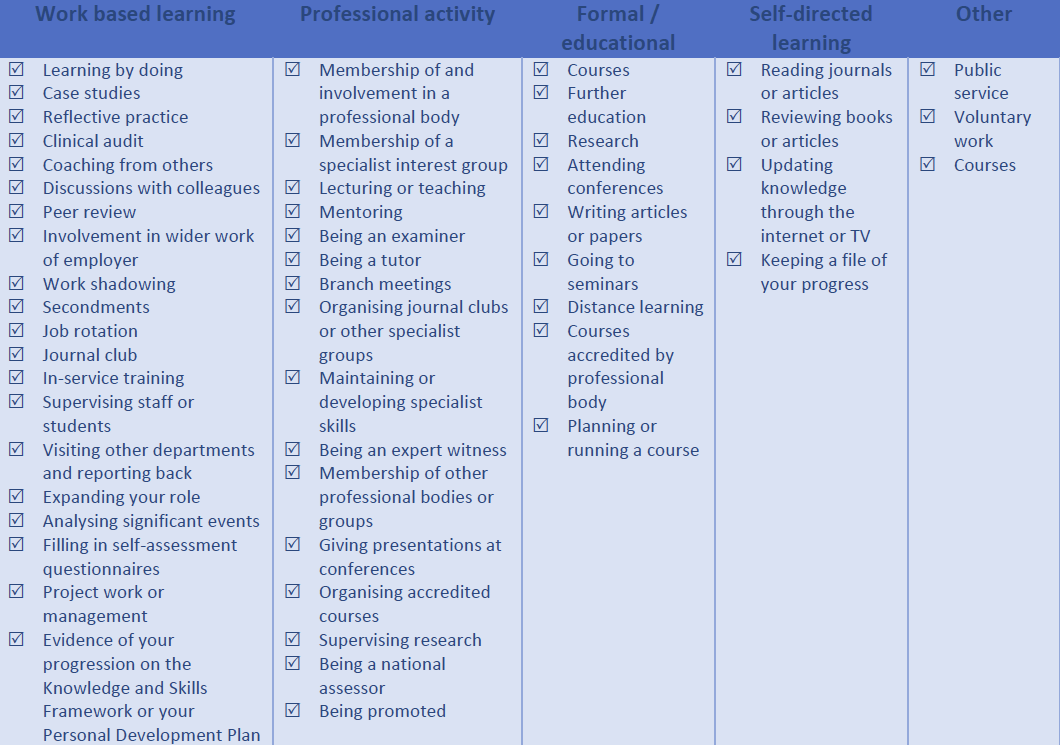
The connection between CPD and accreditation: not one and the same
Sometimes when health professionals are trying to decide if a course has significant benefit to them they will ask, “Is it CPD accredited?” but in reality CPD (continuing professional development) and accreditation are two separate things. This article explains the differences and why events do not have to be accredited to contribute to CPD.
What is CPD?
The Health and Care Professions Council (HCPC) defines CPD as “a range of learning activities through which health and care professionals maintain and develop throughout their career to ensure that they retain their capacity to practise safely, effectively and legally within their evolving scope of practice”. The Institute of Physics and Engineering in Medicine (IPEM), as well as the other engineering bodies, use similar definitions. In short, therefore, CPD is lifelong learning.
In the UK, regulated health professionals are expected to record CPD activities, and individuals may be audited annually (engineering) or biennially (HCPC) as part of maintaining their professional registration. While there is no set amount prescribed by the regulatory bodies, there are numerous activities which can contribute to CPD (see Table 1).

Table 1: HCPC (non-exhaustive) list of suggestions for CPD activities
Note: IPEM has its own list at http://www.ipem.ac.uk/Portals/0/Documents/CPD/CPDActivities.pdf
However, simply engaging in these activities is not enough; it must be evidenced within an ongoing CPD record. Generally this is done through a process of 'reflective learning' to demonstrate that a person has thought about what they have learned from the activity and how it has enabled them to do their job more effectively. Most individual professional associations provide more specific guidance on how to write reflectively:
- CSP http://www.csp.org.uk/professional-union/careers-development/cpd/keeping-portfolio
- COT https://www.rcot.co.uk/cpd-rcot
- IPEM https://www.ipem.ac.uk/TrainingWorkforce/CPD.aspx
What is accreditation?
Accreditation is the quality assurance awarded to a formal learning event, usually by an educational body or a professional body, relevant to its content. The quality assurance means that the learning event’s teaching materials, style of delivery, and supporting resources meet the stated objectives at a level set by the accrediting body. If a learning event is assessed as meeting the standards set by the educational or professional body, the accrediting body allows the organiser of the event to use the accreditation logo as a means of demonstrating the quality of their event.
After the learning event, participants on an accredited course have some work to do to evidence how well their learning has met the stated objectives, using pre-defined criteria. The amount of work required will depend on the length and content of the learning event, the depth of the stated objectives, and the requirements of the accrediting body. If a learning event leads to a qualification for example, considerable in-depth coursework may be required. The participant’s coursework is subsequently assessed against the criteria, and must meet or exceed them in order for a certificate to be awarded to the participant. Learning events which are accredited are audited by the accrediting body for compliance to their educational or professional standards, and an annual application is usually required in order for accreditation status to be maintained.
So, what does this mean?
This means that there is no such thing as 'CPD accreditation'. CPD can be maintained through events that are not accredited, and an accredited event does not necessarily translate into CPD, especially if it is a topic not directly or obviously related to a specific profession.
It means that, if a course provider claims a course is accredited, the name and/or logo of the accrediting body should be visible, as should the learning outcomes and evaluation methods. If these are missing, the organisers may be confusing accreditation with CPD.
And finally it means that, whether accredited or not, in order to gain maximum CPD value from the extras that we do, health professionals must plan their CPD activities, think about them reflectively, and write them up. It’s not enough to simply turn up and leave with the certificate!
Clare Canale
Clinical Research Manager, Leckey
March 2015


.jpg)
.jpg)
.jpg)
.png)
.jpg)
.png)


no comments
Add your comment...